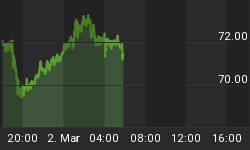Eurozone retail sales fell only slightly this month, but it was the 5th consecutive month, and the worst quarter since the 1st quarter of 2010.
Please consider Markit Eurozone Retail PMI® March 2012.
Retail sales in the Eurozone fell only marginally at the end of the first quarter, according to Markit's latest PMI® surveys. The average rate of decline over the first quarter matched that seen over the final three months of 2011, which was the worst quarter since Q1 2010. The survey data again highlighted marked disparity between growth in Germany and falling sales at Italian retailers, while sales in France were again broadly flat.
The Eurozone Retail PMI is a single-figure indicator of changes in the value of sales at retailers. The PMI is adjusted for seasonal factors, and any figure greater than 50.0 signals growth compared with one month earlier. The PMI remained below 50.0 in March, signalling a fifth successive monthly drop in sales revenues. Sales have fallen ten times in the past 11 months. But the index rose for the second successive survey, recovering further ground from January's 35-month low of 42.9 to post 49.1. The latest figure signalled only a marginal decline in sales revenues. The latest PMI figure suggested that the pace of decline in retail sales as measured by the EU's statistical office Eurostat (on a three-month-on-three-month basis) will ease in the coming months.
Eurozone retail PMI figures are based on responses from the three largest euro area economies. March data signalled that the Italian retail sector remained mired in a steep downturn, posting a thirteenth successive monthly drop in retail sales. The rate of contraction was slower than January's record low, but still marked nonetheless.
German retail sales continued to rise in March, extending the current sequence of growth to 18 months. This is the longest period of expansion since monthly sales data were first collected in January 2004. The rate of growth slowed since February, but was broadly in line with the average for 2011.
Year-on-Year Sales Decline 10th Month
Retail sales in the Eurozone continued to fall on an annual basis in March. Year-on-year sales have fallen for the past ten months, the longest sequence since that registered from June 2008 to March 2009. Moreover, the rate of decline accelerated since February, reflecting a sharp reversal in the year-on-year sales trend in France. German retail sales registered the fourth-fastest annual increase in sales since the series started, but Italy posted another substantial decline.
Other indicators from the latest surveys underlined the ongoing weakness of market conditions in the retail sector. The value of purchasing activity fell for the eighth month running, while retail employment was broadly flat for the second successive month. Retailers' gross margins remained under substantial downward pressure, and original sales plans were missed again.
Commenting on the retail PMI data, Trevor Balchin, senior economist at Markit and author of the Eurozone Retail PMI, said:
"Across the Eurozone, retail sales fell only marginally during the month but were down sharply compared with one year ago. Compounding retailers' difficulties, wholesales prices continued to rise at a steep rate, squeezing margins which have already been under intense pressure from the need to offer discounts to stimulate sales."
Markit Clings to Hope
Once again Markit clings to every bit of hope that things are about to get better. Here is the key sentence: "The latest PMI figure suggested that the pace of decline in retail sales as measured by the EU's statistical office Eurostat (on a three-month-on-three-month basis) will ease in the coming months."
Why?
Why are sales in Europe going to get better? Once again I propose it is far more likely for German sales to slip as its vaunted export machine takes a hard tumble.
I said the same thing two months ago regarding Manufacturing PMI when Markit was hoping Germany could keep Europe out of recession.
The no-recession idea bit the dust on March 22 as noted in "Eurozone Slides Back Into Recession" Says Markit PMI News Release; Sharp Decline in German Export Business; Misguided Decoupling Theories.
Markit then shifted its stance from hoping for no recession in the Eurozone, to hoping for no recession in Germany and I responded with:
What's with the Markit "Pollyanna" Forecasts?
This month Markit is talking about Germany avoiding a recession. Even more amazingly, just last month Commenting on the flash PMI data, Chris Williamson, Chief Economist at Markit said:
"A retreat back below the 50.0 no-change level for the Eurozone PMI is a disappointment, and highlights the ongoing risk that the region may be sliding back into recession.
That "risk of recession" became a sure thing as Markit threw in the towel on non-recession hopes as noted above.
On February 22, in Eurozone PMI "Worse Than Expected" and Back in Contraction; Expect German-Periphery Divergence to Resolve to the Downside for Germany I stated:
Expect German-Periphery Divergence to Resolve to the Downside for Germany
The idea that Europe can avoid a recession is complete silliness. Europe is clearly in a recession already.
The amazing thing is things have not deteriorated more than they have. Unlike the Chief Economist at Markit, I expect the divergence to resolve to the downside for Germany, not for the divergence to continue for some time. Given conditions in Europe and Asia, the odds that Germany is immune from the global slowdown are essentially zero.
Sure enough, German exports took a dive in March, and it's reasonable to assume another dive in April.
Conditions in Europe are deteriorating badly, and a general strike looms in Italy. Spain, Greece, and Portugal are basket cases. The odds that weakness does not spill over into Germany are near-zero.


















